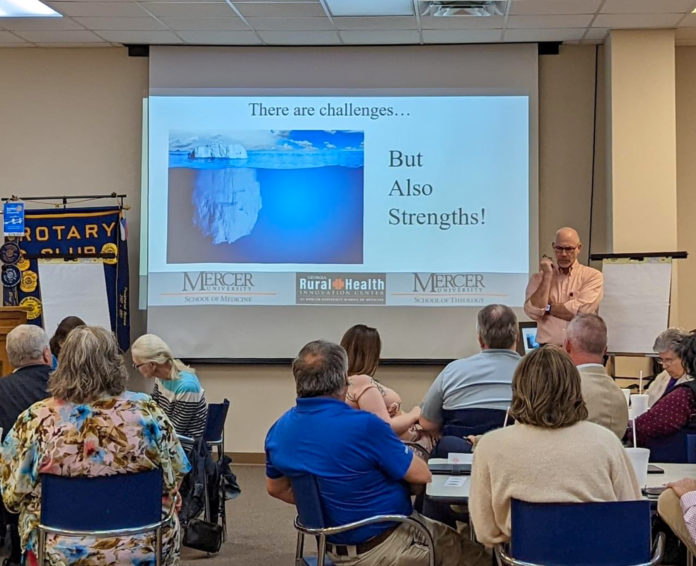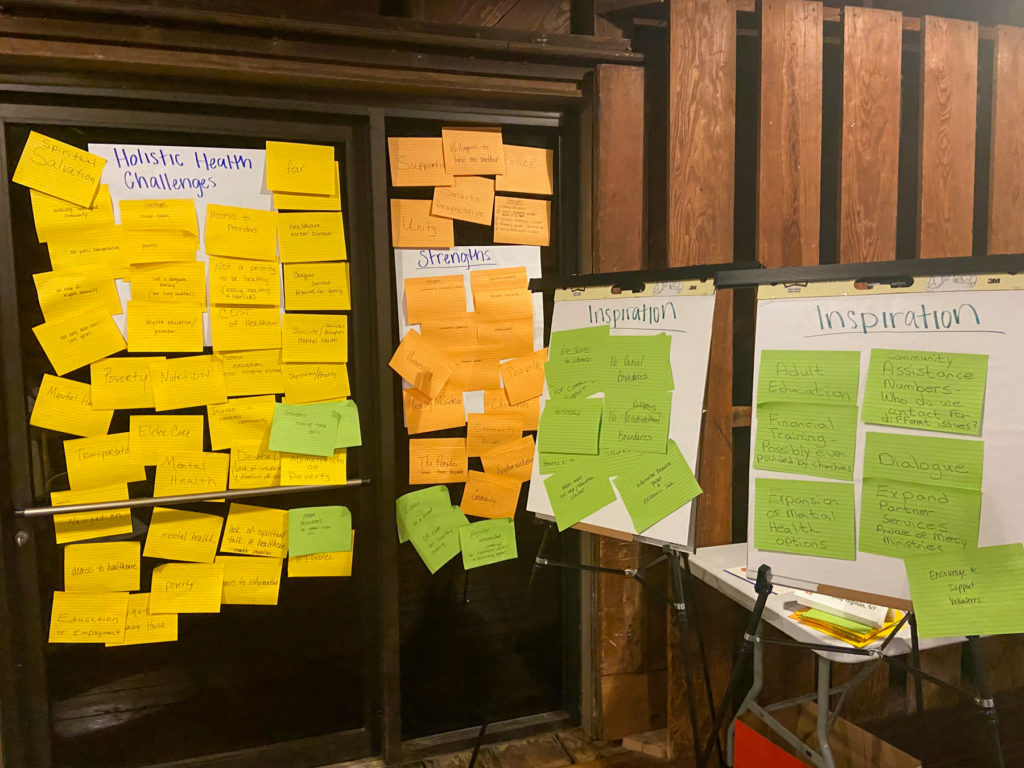
Since opening her family medicine practice in rural Georgia three years ago, Dr. Jacqui O’Kane has often lamented the lack of resources for people dealing with addiction.
Now, thanks to connections made at a recent meeting of Mercer University’s new Faith in Rural Health initiative, a partnership among the Georgia Rural Health Innovation Center, School of Medicine and McAfee School of Theology, she can offer her patients a way to get support.
“There was someone who gave out flyers about a program that they had just started wherein a person could go to these meetings at a church and talk about addiction with other people dealing with it,” said Dr. O’Kane, who practices in Berrien County. “The very next day, I had flyers that I brought to the office, and I couldn’t believe it, I had two patients who said, ‘Gee, I wish I had somewhere to go where I could talk to somebody else who understood what I was going through in my addiction.’ And I was able to give them those flyers, and they attended those meetings.
“I am connecting people to the things that I am learning about.”
Creating connections like this is part of what the Faith in Rural Health program is all about. The initiative aims to support the physical, mental and spiritual health of people in rural Georgia counties by coordinating the efforts of clergy, physicians and health care professionals.
The purpose of the three-year project, which started in March 2022, is threefold: to assess areas of need and opportunities for collaboration, to collaborate with existing sites for holistic care modeling and student training, and to create relationships between medical professionals and local clergy for synergetic work. The initiative currently is underway in Berrien, Putnam, Toombs and Montgomery counties.
“The idea is to try to address some of the rural health disparities by getting the faith leaders and health care providers in a community to work together,” said Paul Byrd, Faith in Rural Health program director and a former pediatric chaplain who has 30 years of experience working in major health centers.
Much of the past year has been spent getting to know faith leaders and health care providers, holding community meetings, and conducting needs and opportunities assessments. Generally, health care providers, clergy and patients agree that health and spirituality are connected, Byrd said.
“When we think of holistic health, which is spiritual, mental, physical — all of it — I don’t think there’s a differentiation for many people,” he said. “I just think that we’ve so (divided) health care and faith that it’s almost like people are afraid to talk about them at the same time.
“This initiative is not about trying to bring people into church. It’s simply trying to connect these two groups of people to help with some of the very serious health disparities in the community.”

As part of the program, students from the School of Theology and School of Medicine work three-week rotations in the designated counties. Student interns are a sent in pairs, with one from each school, so they can develop a relationship and learn from each other’s experience and point of view, Byrd said.
“We’re hoping that the students walk away changed and adopt the goal of creating cross discipline (faith/health) collaboratives when they move into communities,” he said.
In January, students conducted qualitative research assessing community needs and opinions of stakeholders.
Daniel Pham, a first-year medical student, worked in Berrien County, where he found religion plays a significant role in the residents’ daily lives. He said he found it interesting that while both clergy and health care providers agreed on integrating health care and religion, both feared the other side would be against it.
“Health care providers weren’t very sure if religious leaders would be keen on the idea of health care being integrated into religion and vice versa,” said Pham, who earned a Bachelor of Science in biochemistry and molecular biology from Mercer in 2021.
Tonja Meadows, who completed a Master of Divinity in December and is now pursuing a Doctor of Ministry at Mercer, worked as a student intern in Putnam County.
“The biggest issue that I could see was that many people have to drive outside of the community to get certain health care needs, especially when it comes to cancer. Some people have to drive to Athens or Augusta for care. There’s also a great need for mental health care here,” Meadows said.
The community has a lot of resources and many people want to help, but more conversations are needed to connect resources with those who need it, she said.
Cecil Kilgore, a faith leader in Putnam County, said initial meetings in the community have been successful in identifying needs of the county’s diverse population. Kilgore is CEO of Reach2Teach, the outreach division of New Life Outreach Christian Center.
“We’re both trying to save lives,” Kilgore said of faith leaders and health care providers. “A lot of times when it comes down to it, we’re dealing with life and death situations. There are times when medicine is a definite solution to the problem, and then there are times when physicians have done all they can do, and you rely on your faith in Christ Jesus.”









